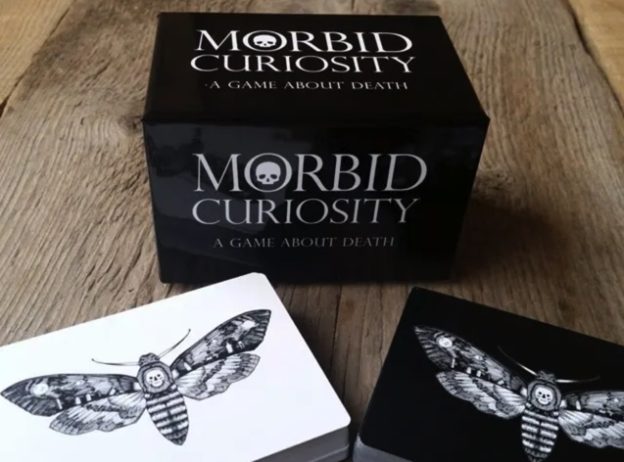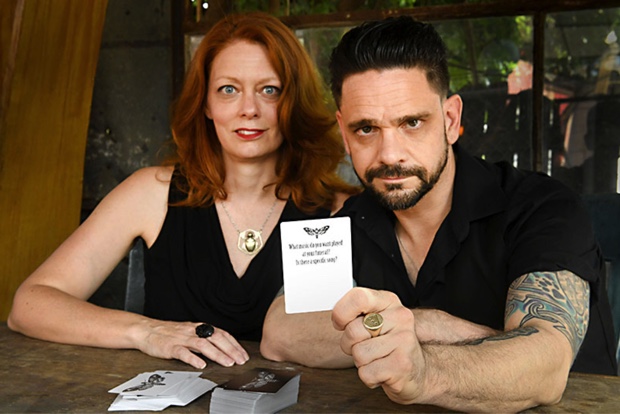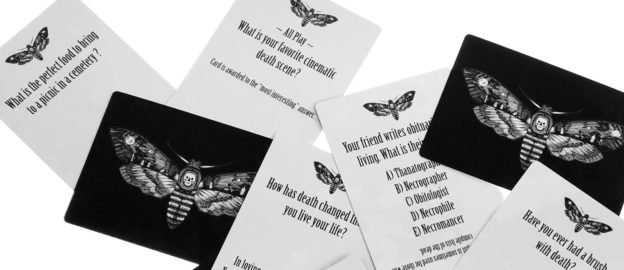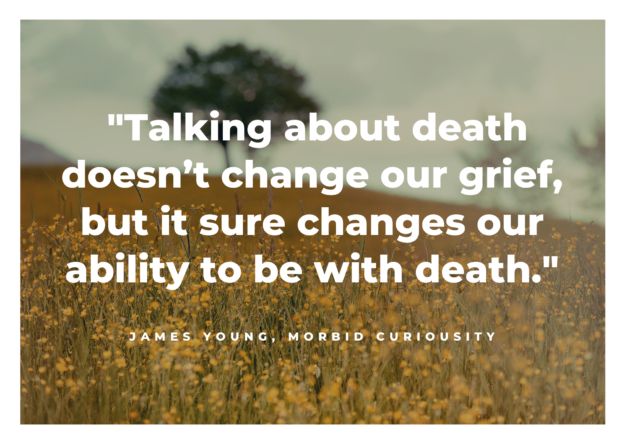Morbidly Curious? This Death Card Game Makes Space for Conversations Around Death
October 11th, 2022
In my own search for new and better ways to invite death into our lives and especially in conversations, I came across the death-inspired card game called Morbid Curiosity.
James and Kimberley, a couple with a background in theater and grief counseling, started creating the game before Death Positivity was trendy and cool.
Their approach to the game sparked my own morbid curiosity, so I decided to (virtually) sit down with them for an interview on how it all started, how it’s going, and where they see this game (and the whole death positive movement) taking us.

Photo courtesy of The Austin Chronicle
Check out the interview below…
First off, tell me about you and your partner, and how you got started doing what you do.
Well, we’re an interesting pair. Kimberley is a grief therapist as well as a talented photographer, designer, and actor. I’m is a bit of a renaissance man as I am a classically trained actor, a theater teacher, have a Master’s Degree in history, a life-long student of various martial arts, a musician, lead singer and songwriter of Austin-based Irish punk band and a vessel of strange, and sometimes dark knowledge.
A number of years ago, Kimberley was working at a grief center. She and a colleague were sitting one evening discussing how they felt after working with their groups. They noticed that the weight of the day was different when working with children than with adults.
For example, the kids were very open and honest about death. They easily offered support to each other. But when the kids asked questions about death, the adults would often get uncomfortable and start to shut down, and then the kids would get uncomfortable and shut down.
Grief is hard enough, and not being able to ask questions leads to more confusion and loneliness.
Because of this, Kimberley wanted death to be invited into our conversations. She started working on the idea of a game, and pretty soon pulled me into the game creation. So much of the game took form when the research started to lead down curious paths of trivia and stories. The trivia questions quickly became the cornerstone of having these strange, sometimes heavy, conversations.
2. Tell me about Morbid Curiosity. What is it exactly?
Morbid Curiosity is a card game of 162 questions, every one of them about death. It weaves an evening of conversation by drawing people in through exploring history, culture, science, personal experience, absurd questions, and humor. Players pull from two decks – one filled with trivia and one of discussion questions. They read the card aloud, and discussion ensues. For the trivia part, the first person to get the right answer wins.
If you pull a discussion card, then the invitation is to listen to each person’s answer and reward the card to the person who’s answer they liked best. They collect cards until someone reaches 7 and is proclaimed “Most Morbid”. The fun is that the two types of cards moves you through talking about death, involving everyone. It’s not just about being a “death geek”, or about knowing a lot of death-related info. It’s about storytelling, communication, and creativity.
Here are some examples of questions you’d find in the deck…

3. What was your intention to create the game? Who is it designed for?
Well, first and foremost, we want people to have a good time. But, in the larger sense, we want to give people a vehicle, and outlet, to talk about death. So often the only times we talk about death is when someone is dying, you’re already at the funeral, or you’re with a therapist. Often, families have little exposure to the process of dying. Plus, the taboo of talking about death leaves the living without a way to process grief, prepare for our own ending, or face our mortality and thus embrace life more fully.
Since the Civil War, the dominant Anglo-Protestant culture in our country has taken a hands-off approach to death care, and given it over to death industry professionals. It has become a topic that many people don’t talk about. And we need to. We will all have to deal with it at some point.
Now, there are a number of programs out there that work to get people to talk about last wishes, DNR, will’s, and beyond. Our game was created to let people have a way to talk about death in a disarming, fun way, without all the pressure or awkwardness. Some people are darklings like us who revel in discussing the strange and unusual. Some are people who want to talk about death, but are afraid of judgment from others. And some are people who are afraid to talk about death, but their fear causes unnecessary suffering. We hope our game can help loosen the taboo and let people share and explore.
4. What kind of response have you received on the deck so far? Any interesting or noteworthy experiences, stories or testimonials?
When Kimberley first started working on the game, she thought she might just be a bit strange. And then she discovered Ask A Mortician, Death Café’s, the Death Salon, and a wealth of other voices that encouraged her to keep going.
We hear from a lot of people telling us how much they love our deck, and how much fun they have playing it. When we get to interact with people who have played it, it’s always a joy to hear the stories people share with us, it’s what keeps us going with the project as we’ve had it in our life now for about eight years. They’ve inspired us to go on to create a second deck of conversation cards called Memento Mori; More Questions About Death.
We love that people end up having a playful, humorous evening with the game. But, the best stories are when we hear about even bigger impacts. One person wrote to us about playing the game with her mom who had never spoken about death. After an evening of laughter, they finally had discussions about what she wanted for her funeral. Another friend told us it got him to write his will, which he had been putting off. Another man came up to James at a vending event and said: “We’ve been married for 30 years. We need to have these talks. We need a way”.
We also hear from death care professionals about how useful they think the game is. We even get funeral homes wanting to buy the games to leave out for people to casually start a conversation.
5. What have been your biggest lessons on death (and beyond) in your journey of creating and launching this game?
One lesson is that many people want to talk about death but don’t always know how. Most people have a curiosity about it. I think we are hardwired to be.
When we created the game, we found ourselves a part of the larger Death Positive movement, and discovered a large group of people who are creating ways for more of us to talk about death, get more involved in death care, and find less invasive and more eco-friendly ways to tend to the body.
Kimberley and I had a very different set of experiences regarding death. Kimberley’s parents didn’t talk about death. “They’re dead. Move on,” was their attitude. She didn’t go to a funeral until she was an adult.
I was around a lot of death. Family, friends, wrong place/wrong time, a few close calls myself. Since we started the game, we’ve tended to the death of several pets, and sat bedside for a dear friend during his final days. My stepdad succumbed to cancer in 2017. Kimberley lost both her parents just two weeks apart in 2019. And my dad died last month. Death has become a companion in our life. You can’t really avoid it. And when it came to our parents, the things we’d learned about the death care business and our connections in the profession helped as far as knowing what to do and who best to call.
Despite it all, this game hasn’t taken the sting out of death. It still hurts. It still sucks. But, now it’s not unfamiliar. It isn’t unknown territory. We’ve learned that talking about death doesn’t change our grief, but it sure changes our ability to be with death.

6. What are some things you wish the general public knew about death as they prepared for it?
We have a whole list! Here’s what we wish the general public knew about death:
- It’s best to talk about death with your friends and loved ones while you can.
- There are many different options when it comes to what to do with the body, funerals, etc.
- Rituals to honor the dead are important, beyond the funeral.
- Death is a part of life and we should be as open and familiar about it as much as any other.
- Talking about death doesn’t eliminate the grief, pain, and sense of loss. You will still feel all of it. And that’s ok.
7. Where do you see the death profession heading in the coming years?
We see the emergence of the new wave of death care professionals. They tend to be younger, are often female, and are leading the way in the Death Positive movement. They are normalizing both some very old ways of final disposition of the body, as well as exploring new ones, like aquamation and terramation. The “traditional” wing of the death care industry isn’t going anywhere, there will just be more ways of going about it.
8. Anything else you’d like to share with us here?
Right now, we are a grieving family. James’s dad’s funeral was a week ago. It’s all still pretty raw. But, being open to talking about death made some of the discussions we had to have less unfamiliar and less overwhelming.
The funeral was important. We needed it. The family needed it. His friends needed it. But, because our family had experience with talking about death, as well as a lot of familiarity with the preparations, we were an active participant in creating the funeral. And, we were able to honor him in the way we thought he’d want and the way that was right for us.
Lastly, being “death positive” doesn’t mean that you get to avoid the messy bits. It’s just easier to accept that death comes to everyone and it will be a part of your life.
Talk about death. It’s not scary. It gets more comfortable the more you do it.
Final words from the interviewer
I personally got a chance to play Morbid Curiosity with my partner and it was truly a damn good time. Plus, we were able to connect on the topic of death in a way we’ve never been able to before. I highly recommend getting a copy of the deck, especially if you’re a death care professional. And really especially if you’re a funeral home. What a great thing to keep around to encourage gentle and evem humorous chats about death.
If you want to purchase a copy of your own Morbid Curiosity game, you can visit James and Kimberley’s website here.


[…] Source link […]